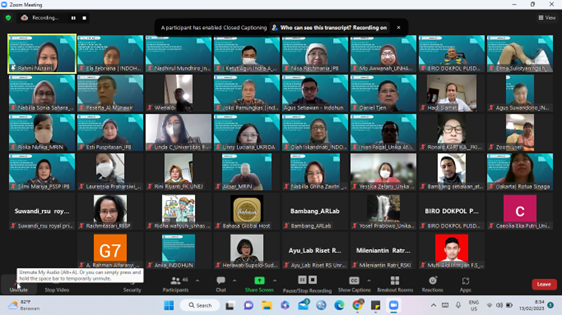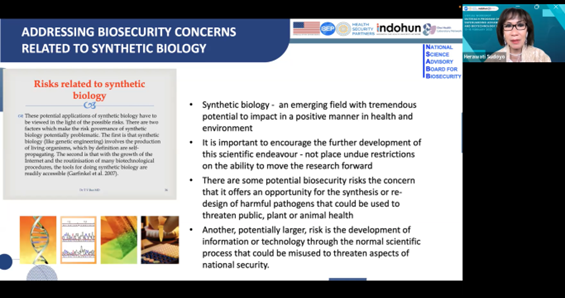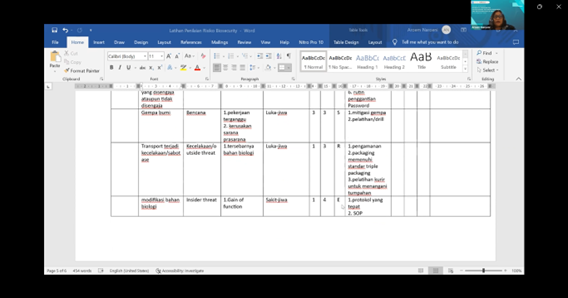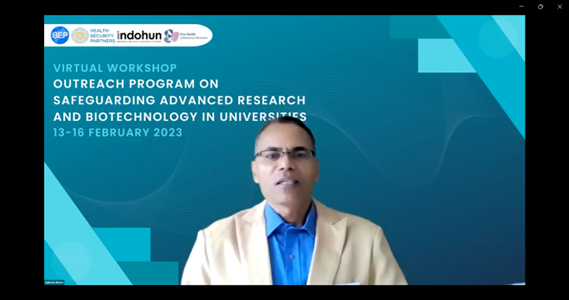
Participants from various majors and universities
Currently the field of emerging biotechnology and its application in the world and in Indonesia continues to grow rapidly, because it’s getting easier to perform and also cheaper. At the same time, issues of bioterrorism and research with the potential for dual use are also increasing. As a network that supports the establishment of integrated collaboration systems between human and animal health laboratories in the universities in Indonesia, members of university under the program of One Health Laboratory Network (OHLN) are performing research activities that may use emerging technology as well.
To promote and increase the knowledge related to the emerging technology issues, Indonesia One Health University Network (INDOHUN) through One Health Laboratory Network (OHLN) program in collaboration with Health Security Partners (HSP) held a four days virtual workshop from 13 – 16 February 2023 on “Outreach Program on Biosecurity Safeguards and Instil Best Practice for Advanced Biotechnology in Universities”. This workshop provides an understanding of the consequences of emerging biotechnology, including research that has dual use aspects as well as to introduce biosecurity pillars that need to be applied in the laboratory. Furthermore, understanding the importance of biosecurity will also prevent the misuse and loss of hazardous biological materials.The workshop was attended by 32 participants from various majors and universities, especially those who are well known as research centres of excellence.

Presentation from Prof. dr. Herawati Sudoyo, M.S, Ph.D
The first day of the program commenced with an opening remark conducted by Prof. dr. Agus Suwandono, MPH, Dr.PH as the INDOHUN Coordinator, followed with another opening remark by representatives from Health Security Partners (HSP) and by Dr. Prasad Kuduvalli and Director of Resources, Directorate General of Higher Education, Research and Technology by Dr. M. Sofwan Effendi, M.Ed. The next session was focused on three topics followed with a discussion session after each presentation. The presentation topics for the first day are as follows:
- One Health Security delivered by Mayor Jenderal TNI (Purn.) dr. Daniel Tjen, Sp.S
- Nonproliferation Norms: Biological Weapons Convention and National Biosecurity Regulatory Frameworks delivered by Prof. dr. Herawati Sudoyo, M.S, Ph.D
- Introduction to Dual-Use Research in the Life Sciences delivered by Aroem Naroeni, DEA., PhD
Following the previous day, the activities on the second day were filled with three topics. The topics of the presentations are:
- Advanced Technologies in Life Sciences Research and the BWC delivered by Prof. Lim Yang Mooi, Ph.D
- Culture of Responsibility and Codes of Conduct for Life Sciences Research delivered by Prof. dr. Herawati Sudoyo, M.S, Ph.D
- Governance of Dual-Use Research in the Life Sciences: Role of IBCs delivered by Dr. drh. Diah Iskandriati, IFBA PC
Each topic ended with a discussion session to provide an opportunity for participants to ask questions related to the topic of the presentation that has been delivered. After receiving information through the presentations, the participants were given an exercise to list all possible practices that they can think of that would protect advanced biotechnology from misuse at their institutions. This exercise also concluded the activities on the second day.

Presentation from Aroem Naroeni, DEA., PhD
The third day’s activities started with a presentation of “Disinformation against life sciences research institutions” that was delivered by Dr. Julie Fischer from Georgetown University. The activity followed by a case study about “Countering Disinformation against life sciences research institutions” was conducted by the facilitator, Dr. drh. Diah Iskandriati, IFBA PC. The participants were then divided into three groups to discuss three different topics, which are the oversight of institutions, policies, and guidelines in universities and research institutes in general, the biorisk risk assessment in biotechnology laboratories, and physical security and access control, inventory management, transportation of Valuable Biological Materials (VBM), cybersecurity, and personnel reliability. The activities continued with a presentation from Dr. Subhash J. Bhore, PhD (Genetics), IFBA CP (BRM, Biosecurity, BSC) about “Biosecurity Assessment Tools for Risk Management at the Life Sciences Institution”. The activities on the third day concluded with a homework assignment for all the participants to use the biosecurity assessment tools to assess the biosecurity implementation and documentation in participating institutional laboratories.
The agenda continued on the fourth day that started with a review of the homework assignment conducted by Dr. drh. Diah Iskandriati, IFBA PC. The activity followed by presentations by Rachmitasari Noviana, SKH, M.Si about “Cybersecurity at Life Sciences Institutions” and Dewajani Purnomosari, M.Sc, PhD, IFBA PC about “Implementation of Institutional Biorisk Management Systems and How it Can Help Institutions Counter Disinformation” which both ended with a discussion session. The fourth day marked the last day for this event.
To evaluate the success and effectiveness of this activity, INDOHUN provided a knowledge assessment to all participants before the activity began and after it ended by using a Likert scale from 1-5, namely 5 (Very Know), 4 (Know), 3 (Enough), 2 (Don’t Know), and 1 (Very Don’t Know). Prior to the activity, the average participant score was only 24, but after going through this activity, the average participant score increased to 41. To conclude, this virtual workshop was effectively done and had met the goal of the event to provide an understanding of the consequences of emerging biotechnology, including research that has a dual use aspect as well as to introduce biosecurity pillars that need to be applied in the laboratory. Furthermore, understanding the importance of biosecurity will also prevent the misuse of hazardous biological materials.


Leave a Reply